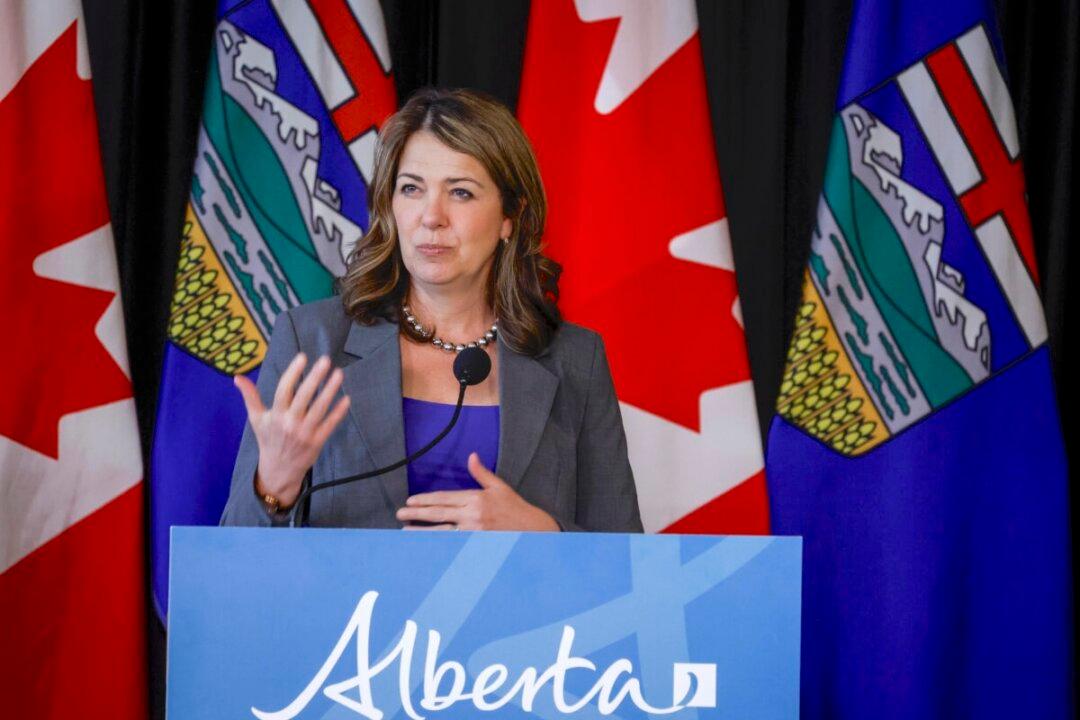Alberta Premier Danielle Smith says her province will submit a formal application to the federal government’s Major Projects Office for a new bitumen pipeline to B.C.’s northwest coast.
The province is committing $14 million toward early-stage planning and design for the pipeline, which it expects to submit to Ottawa by spring next year, Smith said during the Oct. 1 announcement in Calgary.
“Beneath our feet here in Alberta, we stand on oil reserves valued at over $9 trillion. This resource wealth presents Canada and Canadians with boundless opportunities,” Smith said. “What stands before us right now is a once in a generation opportunity to unlock our wealth of resources and become a world leading energy superpower, creating lasting prosperity for generations to come.”
Regarding current federal legislation such as the oil tanker ban on areas of B.C.’s north coast that could impact the feasibility of the pipeline, Smith said discussions are ongoing with Ottawa, including on potentially removing the tanker ban and the oil and gas emissions cap. Smith has called on the federal government to repeal several laws she says are harming Alberta’s oil sector and hindering Canada’s energy independence.
“The federal government must make meaningful and substantive reforms to Canada’s regulatory environment to revive investor certainty,” Smith said, adding, “What I can tell you is this that I am more optimistic now than I have ever been that the concerns of Alberta are finally being heard.”
During an Oct. 1 media briefing prior to Smith’s announcement, Alberta’s Deputy Minister of Energy Larry Kaumeyer said that the proposal being developed is for a 42-inch bitumen pipeline that will move up to one million barrels per day from Alberta to the B.C. coast. Although the route has not yet been decided, Kaumeyer said Prince Rupert and Kitimat, B.C., are being considered as potential end points for the pipeline.
He said discussions had already been taking place with all levels of the B.C. government this week regarding the pipeline application plan.
Kaumeyer said Alberta is acting as proponent to get the proposal ready for submission because pipeline companies aren’t willing to take the risk of further rejections and monetary losses such as those experienced in the failures of the proposed Energy East, Northern Gateway, and Keystone XL pipeline projects.
In her remarks, Smith said that if all three projects had been approved it would have added $55 billion to Canada’s economy per year.
In preparing the pipeline application, Alberta will chair a technical advisory group comprised of industry representatives and indigenous groups to finalize the application, which it says will greatly expand Alberta’s ability to export oil worldwide, particularly to meet growing demand from Asian markets including Japan, South Korea, China, and India.
“When completed, the project will significantly increase market access to responsibly and ethically produced Canadian crude oil products,” a spokesperson for Smith’s office wrote in an Oct. 1 press release.
Alberta’s Plan
Kaumeyer said Alberta doesn’t ultimately want to own the pipeline, but is working to get the project to the approval stage.
“The objective of the Alberta government is to get it to the starting gate, and it is critical that people understand that differentiation. We are not in the process of having Alberta taxpayers on the hook for owning a pipeline,” Kaumeyer said.
The technical advisory group will include input from experts on engineering, construction and market development, as well as indigenous relations, including a management team comprised of employees from Trans Mountain, South Bow, and Enbridge Energy. It will also include oversight from a panel of government and industry figures including Cenovus executive chair Alex Pourbaix, former Enbridge CEO Al Monaco, and Chief Jim Boucher of the Saa Dene Group of Companies, among others.
“The goal of this planning and pre-front end engineering and design work is to determine the general path and size of the pipeline, quantify costs, initiate early indigenous engagement and partnership, and make the clear case that this pipeline is in the national interest,” Smith’s office said.
Kaumeyer said that after Alberta gets the project to the stage of application approval, he’s “pretty confident” that private capital will come forward to build the pipeline.
Canada is the world’s fourth-largest oil producer with net crude export receipts rising from $6 billion in 2000 to $130 billion in 2024.





